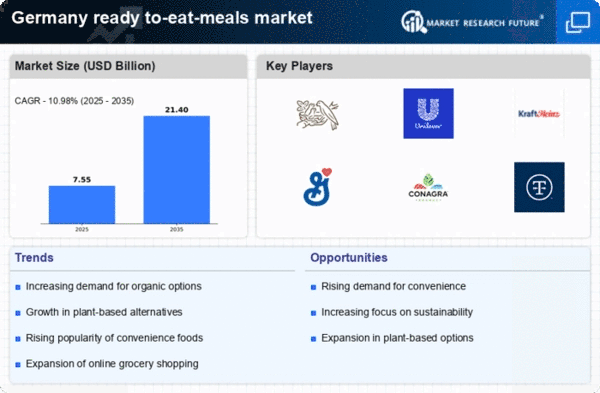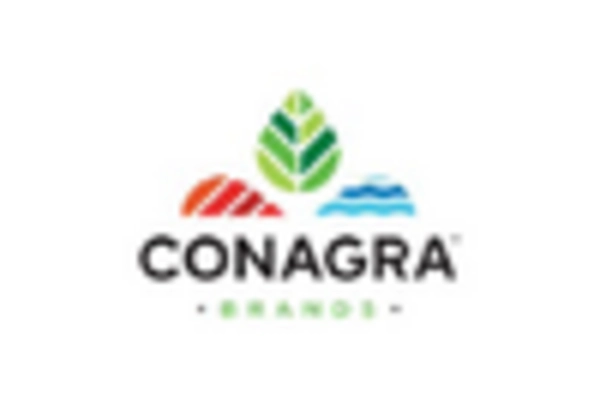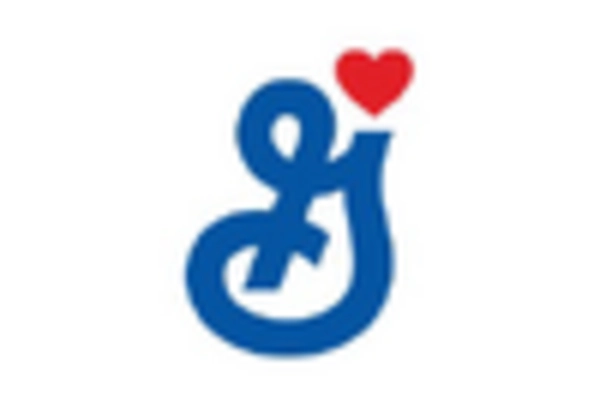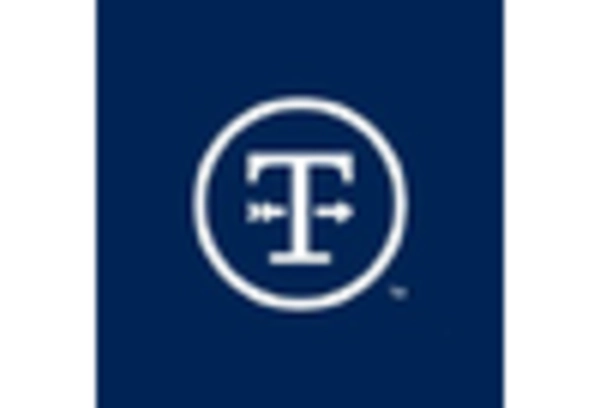Health and Wellness Trends
The increasing focus on health and wellness among German consumers is significantly influencing the ready to-eat-meals market. There is a growing awareness of the importance of nutrition, leading to a demand for meals that are not only convenient but also healthy. Consumers are actively seeking options that are low in calories, high in protein, and free from artificial additives. Recent surveys indicate that approximately 70% of consumers consider nutritional value as a key factor when purchasing ready to-eat-meals. This trend has prompted manufacturers to reformulate their products, incorporating organic ingredients and superfoods to meet consumer expectations. As health-conscious choices become more prevalent, the ready to-eat-meals market is likely to see a continued shift towards healthier offerings, reflecting the changing priorities of the German population.
Convenience and Time-Saving
The increasing pace of life in Germany has led to a growing demand for convenience in meal preparation. Consumers are increasingly seeking ready to-eat-meals that require minimal preparation time, allowing them to balance work and personal commitments more effectively. This trend is particularly evident among busy professionals and families, who often prioritize quick meal solutions. The ready to-eat-meals market is responding to this demand by offering a variety of options that can be consumed on-the-go or require only heating. According to recent data, approximately 60% of German consumers express a preference for meals that can be prepared in under 10 minutes. This shift towards convenience is likely to continue driving growth in the ready to-eat-meals market, as more individuals seek efficient solutions to their dining needs.
Diverse Culinary Preferences
Germany's multicultural society has fostered a diverse range of culinary preferences, which significantly impacts the ready to-eat-meals market. Consumers are increasingly interested in trying international cuisines, leading to a rise in the availability of ethnic meal options. This trend is reflected in the growing popularity of Asian, Mediterranean, and Latin American dishes among German consumers. Market data indicates that around 45% of consumers are willing to pay a premium for authentic international flavors in their ready to-eat-meals. As a result, manufacturers are expanding their product lines to include a variety of global cuisines, catering to the evolving tastes of the population. This diversification not only enhances consumer choice but also stimulates competition within the ready to-eat-meals market, encouraging innovation and quality improvements.
Sustainability and Ethical Sourcing
Sustainability and ethical sourcing are becoming increasingly important to German consumers, influencing their purchasing decisions in the ready to-eat-meals market. There is a growing demand for products that are produced with environmentally friendly practices and sourced from sustainable suppliers. Consumers are more likely to choose meals that feature organic ingredients, recyclable packaging, and transparent sourcing practices. Recent studies suggest that around 55% of consumers are willing to pay more for ready to-eat-meals that align with their values regarding sustainability. This shift is prompting manufacturers to adopt greener practices and communicate their sustainability efforts effectively. As awareness of environmental issues continues to rise, the ready to-eat-meals market is expected to evolve, with a greater emphasis on sustainable practices and products that resonate with the ethical considerations of the German population.
Technological Advancements in Food Production
Technological advancements in food production and preservation are playing a crucial role in shaping the ready to-eat-meals market. Innovations such as vacuum sealing, freeze-drying, and advanced packaging techniques have enhanced the shelf life and quality of ready to-eat-meals. These technologies not only improve food safety but also allow for a wider variety of ingredients to be used without compromising taste or nutrition. In Germany, the adoption of these technologies is becoming increasingly common, with many manufacturers investing in state-of-the-art production facilities. This trend is expected to drive growth in the ready to-eat-meals market, as consumers become more aware of the benefits of these advancements. Furthermore, the integration of smart technology in meal preparation, such as microwaveable packaging that indicates cooking times, is likely to enhance consumer convenience and satisfaction.
















